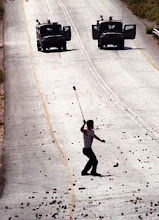Checking in from the capital of Turkish Kurdistan (oh yeah, I said the K-word... and it wasn't Ataturk backwards), Diyarbakir, a pretty crowded and intense city on the banks of the Tigris River (I also crossed the Euphrates today, too!). It's a city with history: inside the old-walled city, there are Syriac Orthodox churches and Armenian churches. It's also a city under seige: just take a walk past the main police station (a few blocks from one of Turkey's oldest mosques, the Ulu Camii) and you can't miss the helmeted troops hunkered down in APC's, machine-gunned turrets swiveling back and forth. It's like Saravena or Barrancabermeja when the Colombian army started to take over those towns.
People strongly identify as Kurdish, and go wild whenever I say thank you in their language. I'm hoping to do a little more looking around this land before heading south into Syria. On August 15th, Ocalan, the PKK's imprisioned leader, is set to announce his "Roadmap to Peace", and if all goes according to plans, it will be read from Eruh, a tiny town not far from here where the first military action of the PKK against the Turkish state took place on August 15th, 1984. I hope to make it there.
This week, a famous Kurdish singer, Aram Tigran, died. He always said that the Turks, Kurds, Armenians and Arabs were brothers and sung in all those languages. He was much loved by the Kurds and his final wish was to be buried here in Diyarbakir. Unfortunately, the Turkish interior minister denied his burial here, and so yesterday he was buried in Brussels. This followed on the tail of a report of police in the western-city of Izmir banned the performance of
the play "Araf", about the murder of Kurdish journalist Musa Anter in 1992 in Diyarbakir.
On a rebellious note, last night as I was sitting around reading and watching a meteor shower over Mt. Nemrut, a young Kurdish guy who worked at the hotel walked past me humming "Bella Ciao". I had a fantasy that it was a secret password among comrades that I had inadvertently stumbled into. And when I asked a metal worker who picked me up on the way down the mountain about peace in Kurdistan, he said something in Kurdish, said PKK and flashed me what I thought was a subversive smile.
Anyways, on a realist note, check out this article about mothers of Turkish soldiers and PKK fighters coming together to say no more war. Another article here.
Update: Actually, singing Bella Ciao doesn't necessarily mean that one is PKK. Apparently, the PKK is more tuned into Kurdish music. So I'm not sure why the kid was humming Bella Ciao... sorry.
Thursday, August 13, 2009
Subscribe to:
Post Comments (Atom)


No comments:
Post a Comment